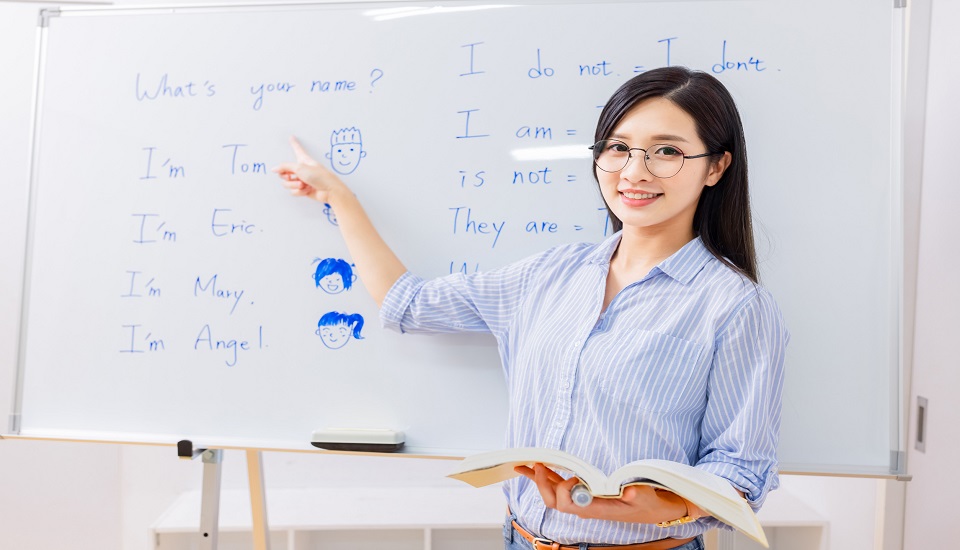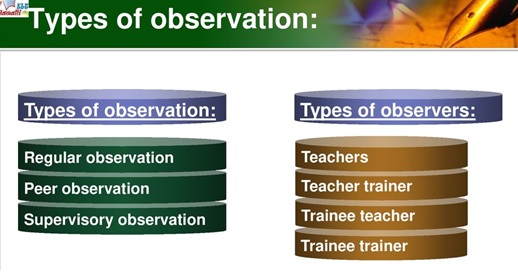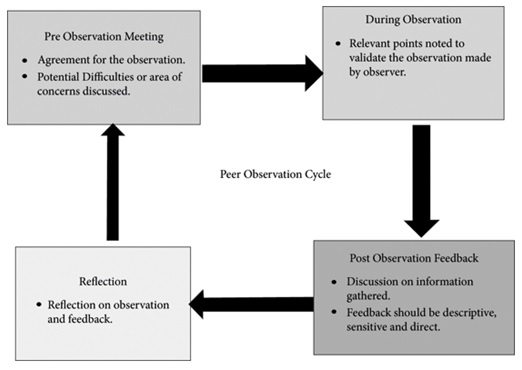TEFL Classroom Observations - Why Is Observed Teaching Practice Valuable?

Teacher observations are part and parcel of every teacher's life especially if you are working as a TEFL/TESOL facilitator in a foreign land. It often takes many forms and there are very few teachers who really enjoy these observations and find them to be fun. The majority of the time dealing with observations is stressful and you font feel like being yourselves. Things can be forced, false, and unnatural since you cannot shake away the feeling of being judged.
So, if you are struggling with preparing for your observation day, here is a checklist to put you at ease.
6 Different Types Of Observations

Source: slideplayer.com
Here is a cumulative list of all the different types of observations that you as a teacher might have to go through:
1. Formal Observations
These are scheduled and pre-arranged observations where the observer comes to your class and observes your teaching. Typically, the observer will complete a pre-observation form, which outlines what they will be looking for, and then provide feedback afterward.
2. Informal Observations
These observations can happen at any time and often occur without prior warning. They may be carried out by a senior teacher, a member of the senior management team, or another teacher. Informal observations can provide useful feedback as they offer a snapshot of your teaching at a given moment, without the pressure of a formal observation.
3. Peer Observations
These observations are carried out by a colleague and are often reciprocal, meaning that you would also observe their teaching. Peer observations can be an excellent way to share ideas, and to get feedback from someone who is in a similar position to you.
4. Unscheduled Observations
These are short observations where the director and principal of senior teachers observe teachers for a short period of time at regular random intervals. Sometimes the teachers are given prior notice but usually, they don't get any intimation and it can happen suddenly. It usually lasts for 10-20 minutes and can sometimes last for the whole season.
5. In-House Observations
These are regular observations perhaps once a year to check the classroom management and teaching skills that can be an essential aid for professional development. Such sessions allow teachers to determine their strengths and weaknesses and set goals based on the observations to progress and advance in their careers.
6. External Observations
Such observations are part of a larger inspection to ensure that all the participating institutions and schools maintain the standards set by the associations. In this type of observation, the whole institution as well as the teaching style is monitored while offering guidance as and when required.
Important Do's and Don'ts
Here is a not-so-extensive list to cover all the essential steps related to classroom observations:
DO’s
1. Be Open To Feedback
It can be challenging to receive feedback on your teaching, but it is essential to be open to constructive criticism.
2. Plan For The Observation
Ensure that you have a clear lesson plan and that you know what you want to achieve in the lesson.
3. Be Yourself
Try not to change your teaching style just because you are being observed. Be authentic, and teach the way you normally would.
4. Be Respectful
It is important to be respectful of the observer's time and to ensure that you are prepared for the observation.
DON’T’s
1. Panic
It is natural to feel nervous before an observation but try not to let this affect your teaching.
2. Over-Plan
Ensure that you have a clear lesson plan, but don't try to cram too much into one lesson. Keep it simple and focused.
3. Ignore Feedback
Even if you don't agree with the feedback you receive, it is important to listen to it and consider how you can improve.
4. Be Defensive
It can be tempting to make excuses or to defend your teaching style but try to remain open to feedback and take on board any suggestions for improvement.
5. Compare Yourself To Others
It is important to focus on your own practice and not to compare yourself to other teachers.
The Role Of The Observer

Source: www.hindawi.com
The role of the observer is to provide feedback on your teaching and to identify areas for improvement. Observers should be objective, and non-judgmental, and provide feedback that is both constructive and supportive. The observer should be someone who is experienced in teaching and has a good understanding of the curriculum.
The observer should provide feedback in a structured and organized way, using clear language and giving specific examples. They should also be able to provide practical suggestions for improvement and should work with you to develop an action plan to address any areas of weakness.
The Importance Of Preparation
Preparation is key when it comes to observations. Before the observation, ensure that you have a clear lesson plan that is aligned with the curriculum and that you know what you want to achieve in the lesson. You should also be familiar with the teaching standards and criteria that you will be assessed against.
It is also important to ensure that you have all the necessary resources and materials for the lesson and that you have checked the classroom and equipment to ensure that everything is in working order. Additionally, also inform your students that there will be someone visiting the class and they should not react or respond oddly and just continue the class as usual.
The Bottom Line
The longer you decide to stay in your profession, the more observations you are most likely to have. It definitely gets better over time, but every time these sessions are around the corner you can't help but feel anxious and overwhelmed. However, after much hard work and effort you have finally achieved a TEFL certificate and are working your dream job so it is just part of the process that will help you learn and grow from your experiences. So, pull up your socks and put your best foot forward when you are about to be observed.
Written By : Sanjana